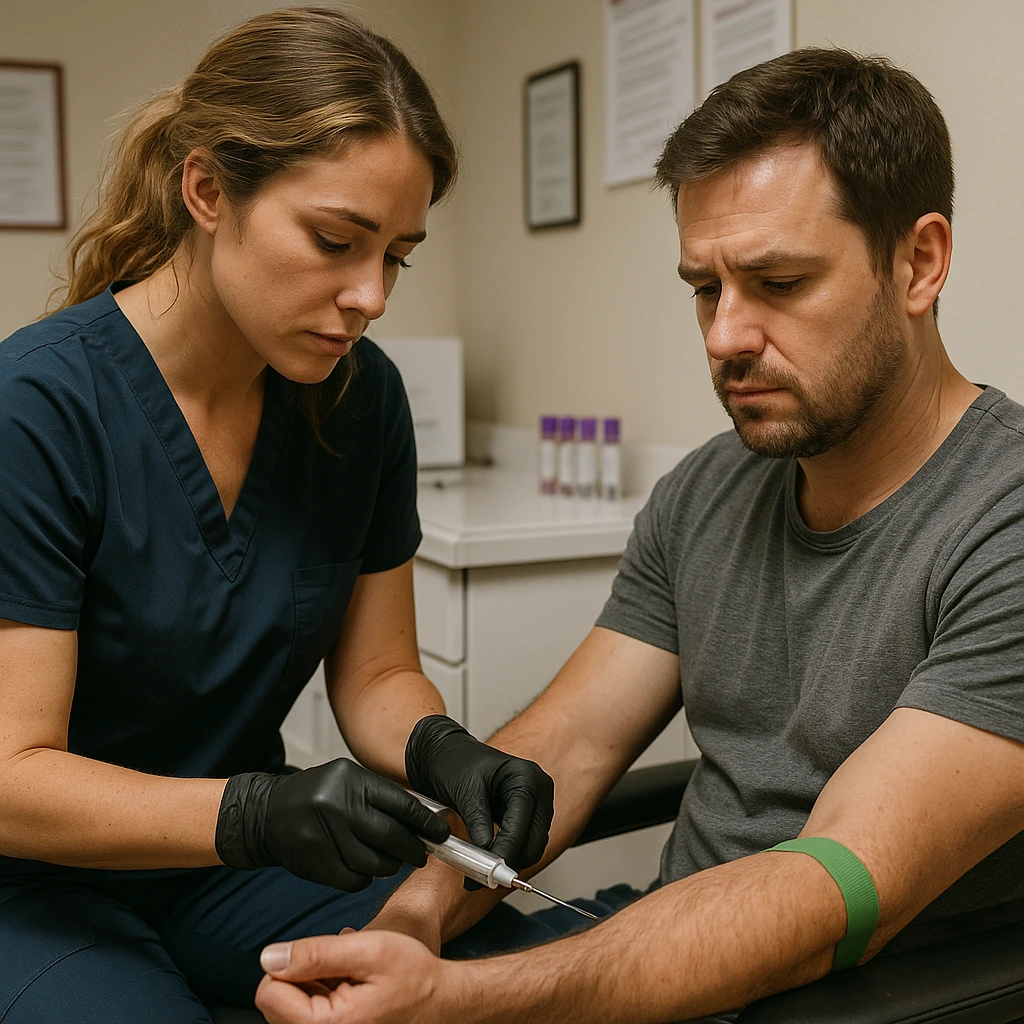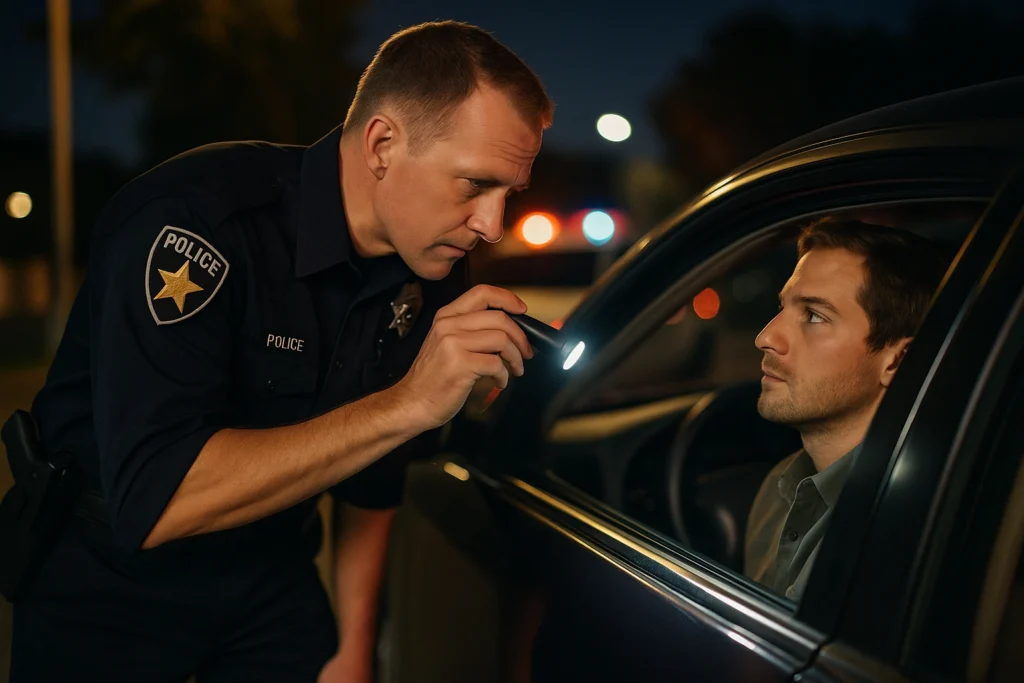
A routine traffic stop can escalate quickly when an officer suspects intoxication and requests a blood test. The right to draw blood isn’t just a medical act—it’s a legal issue tied to consent, warrants, and your Fourth Amendment protections. In Texas, officers may have the authority to request a sample, but they must follow strict procedures to stay within the law. If they cross that legal line, any evidence collected could be challenged in court. Understanding your rights during this critical moment can significantly impact how your case unfolds.
When Law Enforcement Requests a Blood Test
Police usually request a blood test when they suspect someone of driving under the influence of alcohol or drugs. They do this because breath tests can fail to detect certain substances, and urine tests may lack accuracy. Blood testing gives them a stronger case in court.
Officers may request a blood draw:
- After a serious crash
- When a person refuses a breath test
- When drugs—not alcohol—are suspected
- If they believe the driver is under the influence but passed a breathalyzer
Still, asking for a blood draw doesn’t mean it can happen instantly. Officers must follow legal steps before they proceed.
Consent or a Warrant: What the Law Requires
In most cases, law enforcement must get consent or a warrant before they can draw blood. Courts consider a blood test a form of search under the Fourth Amendment, which protects people against unreasonable searches and seizures.
If you give consent, officers can take the sample. But if you refuse, they usually must get a judge to sign a warrant. This requires probable cause—a reasonable belief that a crime occurred and that a blood test will provide evidence.
Implied Consent in Texas
Texas follows an implied consent law. If you drive on Texas roads, you automatically agree to chemical testing if police suspect intoxication. That doesn’t mean they can force a test on the spot. You still have the right to refuse. But refusal comes with penalties like:
- Automatic license suspension
- Use of your refusal as evidence in court
- Possible forced blood draw with a warrant
Implied consent doesn’t remove your rights. It just allows the state to penalize your refusal.
Forced Blood Draws: When Do They Happen?
In certain cases, police may get a warrant to draw your blood—even if you say no. Texas courts allow this when:
- The driver caused a crash involving serious injury or death
- The driver has previous DWI convictions
- A judge signs a warrant based on probable cause
Officers must follow proper procedures. They can’t draw blood in an unsafe or abusive way. The sample must be collected by trained medical professionals under safe conditions.
Courts throw out blood evidence if officers violate these standards.
The Role of Medical Professionals
Only qualified medical staff can perform blood draws. This includes doctors, nurses, paramedics, or certified phlebotomists. The setting must also be clean and safe—usually a hospital, clinic, or mobile unit.
Drawing blood in the field without proper tools or personnel can violate legal and medical standards. Any sign of poor technique or unsanitary conditions may make the evidence inadmissible in court.

Supreme Court Decisions Shaping the Law
Over the years, the U.S. Supreme Court has weighed in on blood draw cases. These decisions affect how states handle DWI investigations.
Missouri v. McNeely (2013):
The Court ruled that officers usually need a warrant to draw blood unless urgent circumstances exist. The natural dissipation of alcohol in the blood doesn’t count as an emergency by itself.
Birchfield v. North Dakota (2016):
The Court ruled that officers don’t need a warrant for breath tests but do need one for blood tests. This reinforced the idea that blood tests are more invasive.
These rulings pushed states to refine their procedures. Texas law now aligns with these decisions by requiring warrants or valid consent.
Can You Say No?
Yes, you can refuse a blood test. But that choice brings consequences. Texas penalizes refusal with automatic license suspension—even if you never face criminal charges. Officers can still apply for a warrant and draw blood against your will if they get a judge’s approval.
Refusal might seem like the safest option, but it can make things worse. Prosecutors may argue that you refused the test because you knew you were guilty.
Blood Test Accuracy and Defense Challenges
Blood test results carry weight in court, but they’re not flawless. Defense attorneys often challenge them based on:
- Chain of custody errors
- Contaminated samples
- Improper storage or labeling
- Medical conditions affecting blood alcohol levels
- Lack of proper consent or valid warrant
Courts take these claims seriously. One mistake can weaken or destroy the prosecution’s case.
DUI vs. Drug Charges: The Need for Blood Testing
In drug-related DWI cases, breath tests don’t help. They only detect alcohol. That’s why blood tests play a larger role when drugs are involved.
Blood testing reveals:
- THC levels
- Prescription medications
- Illegal substances
- Drug combinations affecting mental or physical performance
However, detecting a drug doesn’t always prove impairment. Traces of THC, for example, can remain in the blood for days. Defense lawyers may argue that presence doesn’t equal intoxication.

What Happens After the Blood Is Taken
Once the sample is drawn, it goes to a lab. Analysts check alcohol or drug levels and produce a report. This becomes part of the evidence prosecutors use in court.
If the case goes to trial, the defense has the right to review the sample and lab procedures. They may also request an independent lab to retest the blood.
Your Rights During the Process
Even when under investigation, you keep your constitutional rights. These include:
- The right to remain silent
- The right to legal counsel
- Protection from unlawful search and seizure
- The right to challenge evidence
Knowing your rights helps you respond correctly if officers request a blood test. Legal advice can protect you from costly mistakes and preserve your defense.
When Blood Draws Become Unlawful
Not all blood draws hold up in court. A judge may throw out evidence if officers:
- Failed to obtain a valid warrant
- Drew blood in unsafe or unsanitary conditions
- Lacked probable cause
- Did not give a proper explanation of implied consent laws
- Collected the sample without qualified personnel
Any one of these violations could lead to dismissal of charges.
Final Thoughts
The right to draw blood comes with strict legal safeguards. Officers must follow proper procedures, respect your consent, and obtain a warrant when required. Courts view blood draws as invasive searches, which means they demand clear legal justification. In Texas, blood tests are common in DWI and drug-related cases—but not all are lawful or admissible. If authorities bypassed your rights, the results could be thrown out.
Understanding these legal boundaries empowers you to respond wisely in high-pressure situations. Whether you consent or refuse, knowing the rules protects your freedom and strengthens your defense.

Other Related Articles:
- DUI Expungement and Record Sealing In Texas
- Minor Collision Quickly Escalates To Arrest For DUI
- The Impact of DUI/DWI on Child Custody Cases in Texas
- General Defenses in Criminal Cases
- Examining Criminal Responsibility
- The Ins and Outs of Plea Bargaining in Texas Criminal Cases
- Common Myth About Miranda Rights
- The Reality of the Criminal Justice System in Today’s Time
- Criminal Offense or Case Dismissal??
- The Criminal Process Guide
Frequently Asked Questions
Yes, many organizations offer free or low-cost legal aid services to help survivors obtain restraining orders and navigate legal issues.
Survivors may experience long-lasting psychological and emotional effects. It’s essential to seek counseling and support to heal and rebuild self-esteem.
Offer non-judgmental support, encourage them to seek help, and connect them with local resources and organizations specializing in domestic violence.
Yes, immigration consequences can apply to immigrants experiencing domestic violence. Some may qualify for immigration relief under the Violence Against Women Act (VAWA) or U visas.
Yes, some organizations provide programs and resources for abusers seeking to address their abusive behavior and take steps towards change.



